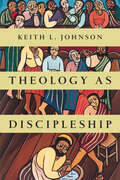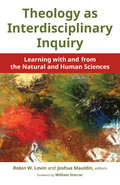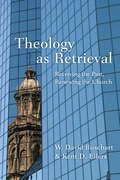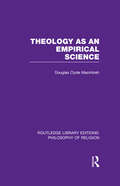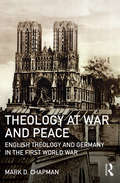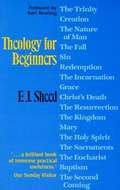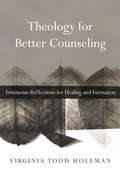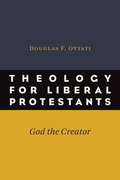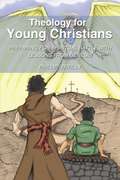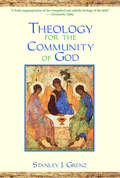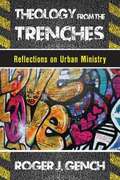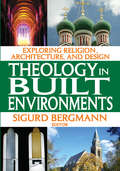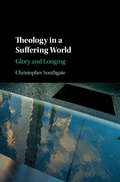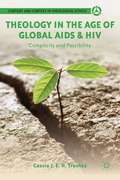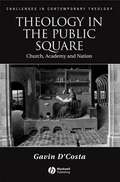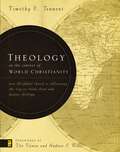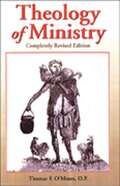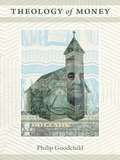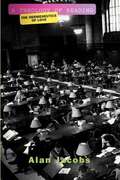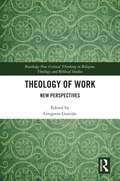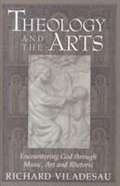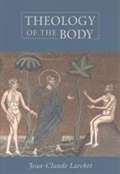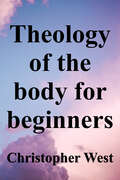- Table View
- List View
Theology as Discipleship
by Keith L. JohnsonFirst Things'GodtalktheologicalTheology as Discipleship
Theology as Interdisciplinary Inquiry: Learning with and from the Natural and Human Sciences
by Robin W. Lovin & Joshua MauldinCan a neuroscientist help a theologian interpret a medieval mystical text? Can a historian of religion help an anthropologist understand the effects of social cooperation on human evolution? Can a legal scholar and a theologian help each other think about how fear of God relates to respect for the law? In this volume leading scholars in ethics, theology, and social science sum up three years of study and conversation regarding the value of interdisciplinary theological inquiry. This is an essential and challenging collection for all who set out to think, write, teach, and preach theologically in the contemporary world.CONTRIBUTORS: John P. Burgess Peter Danchin Celia Deane-Drummond Agustín Fuentes Andrea Hollingsworth Robin W. Lovin Joshua Mauldin Friederike Nüssel Mary Ellen O'Connell Douglas F. Ottati Stephen Pope Colleen Shantz Michael Spezio
Theology as Retrieval: Receiving the Past, Renewing the Church
by Kent Eilers W. David Buschart"Tradition is the living faith of the dead." —Jaroslav Pelikan The movement to retrieve the Christian past is a mode of theological discernment, a cultivated habit of thought. It views the doctrines, practices and resonant realities of the Christian tradition as deep wells for a thirsty age. This movement across the church looks back in order to move forward. David Buschart and Kent Eilers survey this varied movement and identify six areas where the impulse and practice of retrieval has been notably fruitful and suggestive: the interpretation of Scripture, the articulation of theology, the practices of worship, the disciplines of spirituality, the modes of mission and the participatory ontology of Radical Orthodoxy. In each area they offer a wide-angle view before taking a close look at representative examples in order to give finer texture to the discussion. More than a survey and mapping of the terrain, Theology as Retrieval inspires reflection, practice and hope.
Theology as an Empirical Science (Routledge Library Editions: Philosophy of Religion)
by Douglas Clyde MacintoshInvestigating the question ‘can theology, description of the divine reality, be made truly scientific?’, this book addresses logic and human knowledge alongside experimental religion. An important philosophic work by a prolific theologian also known for his later court case regarding conscientious objection, this book describes how it is possible to relate theological theory with religious experience of the divine the way that the sciences relate to human acquaintance with things and people in social experience.
Theology at War and Peace: English theology and Germany in the First World War
by Mark D. ChapmanThis book is the first detailed discussion of the impact of the First World War on English theology. Assessing the close relationships between English and German theologians before the First World War, Chapman then explores developments throughout the war. A series of case studies make use of a large amount of unpublished material, showing how some theologians sought to maintain relationships with their German colleagues, while others, especially from a more Anglo-Catholic perspective, used the war as an opportunity to distance themselves from the liberal theology which was beginning to dominate the universities before the war. The increasing animosity between Britain and Germany meant that relations were never healed. English theology became increasingly insular, dividing between a more home-grown variety of liberalism and an ascendant Anglo-Catholicism. Consequently, this book offers useful insights into the development of theology in the twentieth century and will be of keen interest to scholars and students of the history of theology.
Theology for Beginners (3rd edition)
by F. J. SheedTheology for Beginners has been acclaimed as one of the outstanding modern introductions to theology. It is a clear, precise, and inspiring compendium of the central doctrines of the Christian faith.
Theology for Better Counseling: Trinitarian Reflections for Healing and Formation (Christian Association for Psychological Studies Books)
by Virginia Todd HolemanAt one time, Virginia Todd Holeman "Toddy" thought being biblically literate was all she needed and had little interest in what real theologians talked about. But in her counseling she found that clients pressed her for more. They didn't just want what she had gained through training in the best theories and practices available for counseling. They asked hard theological questions often related to their suffering. As she describes it, they experienced a kind of "theological disequilibrium . . . which left them discouraged, disoriented and often distraught." Holeman shows how deep and clear theological reflection can make a major difference in counseling practice. Not only can it shape who we are, it can also bring into greater alignment our theological commitments, our therapeutic practices and our professional ethics. All the while it can have the most practical effect on our counseling sessions. In this volume Holeman guides counseling students, pastoral counselors and licensed mental health professionals into becoming as well-formed theologically as they are trained clinically.
Theology for Liberal Protestants: God the Creator
by Douglas F. OttatiA two-volume work by Douglas Ottati, Theology for Liberal Protestants presents a comprehensive theology for Christians who are willing to rethink and revise traditional doctrines in face of contemporary challenges. It is Augustinian, claiming that we belong to the God of grace who creates, judges, and renews. It is Protestant, affirming the priority of the Bible and the fallibility of church teaching. It is liberal, recognizing the importance of critical arguments and scientific inquiries, a deeply historical consciousness, and a commitment to social criticism and engagement.This first volume contains sections on method and creation. Ottati's method envisions the world and ourselves in relation to God as Creator, Judge, and Redeemer. The bulk of the book offers an in-depth discussion of God as Creator, the world as creation, and humans as good, capable, and limited creatures.
Theology for Young Christians: Preparing for Spiritual Battle with Lessons from Genesis
by Phillip O'ReillyThe Center for Disease Control recently reported that suicide rates have increased by nearly 30% since the turn of the 21st century. Doubtless numerous factors contribute to this rise, but Stephen Meyer, the author of Darwin’s Doubt, identified one during an interview: the hopelessness of naturalism creates “existential anxiety.” If the universe truly sprang forth from impersonal forces and life from random mutations, life is devoid of meaning. This is the world our children occupy. Educators and policy makers fret over kids’ poor “self-esteem,” yet they peddle philosophies which rob them of all hope.The Bible remedies hopelessness. It offers a window for gazing at the Creator of the universe who gives life meaning. Moreover, it offers a mirror through which young people gain an accurate self-image. As a father of ten kids, I occupy a front-row seat to many attacks of Satan. Without exception, our children’s defenses against those attacks failed when they trusted their own wits or worldly wisdom and succeeded when they embraced the timeless truths of Scripture.Theology for Young Christians provides a framework for gaining a solid foundation in Scriptural truths. The book guides readers through Bible passages using tried-and-tested techniques for interpretation and application. Students are asked questions, shepherded through the process of finding answers and challenged to consider how Scriptural principles should impact behavior and thinking. At the end of this process, young people are better equipped to systematically study the Scriptures. Indeed, they will, we pray, be less dependent upon study guides and prepared to study other passages. Then, godly self-confidence replaces any manmade self-image, steels the young person for life’s battles and instills hope for victory.
Theology for the Community of God
by Stanley J. GrenzThis proven systematic theology represents the very best in evangelical theology. Stanley Grenz presents the traditional themes of Christian doctrine -- God, humankind, Christ, the Holy Spirit, the church, and the last things--all within an emphasis on God's central program for creation, namely, the establishment of community. Masterfully blending biblical, historical, and contemporary concerns, Grenz's respected work provides a coherent vision of the faith that is both intellectually satisfying and expressible in Christian living. Available for the first time in paperback.
Theology from the Trenches
by Roger J. GenchWhile urban pastors devote time and energy to all the typical demands of ministry, they also grapple with challenges endemic to city life. Achieving a measure of balance amid these competing demands and responsibilities can be daunting. Using his experiences as a pastor in urban settings for nearly three decades, Roger J. Gench offers pastors a close look at the challenges that come from being involved in urban ministry. Throughout, he integrates memoir, sermons, and essays on social ministry, and reflections on the theology and spirituality of parish life. In each chapter, Gench offers his own stories and reflections and then invites readers to consider the relevance for their own ministry. Urban pastors will not only find themselves relating to Gench's experiences but will also uncover practical help for their ministry.
Theology in Built Environments: Exploring Religion, Architecture and Design
by Sigurd BergmannBuilt space is both a physical entity as well as a socially and historically constructed place. It constantly interacts with human beings, affecting their behavior, thinking, and feeling. Doing religious work in a particular environment implies acknowledging the surroundings to be integral to theology itself. The contributors to this volume view buildings, scriptures, conversations, prayers, preaching, artifacts, music and drama, and built and natural surroundings as contributors to a contextual theology.The view of the environment in which religion is practiced as integrated with theology represents not just a new theme but also a necessity if one is to understand religion's own depth. Reflections about space and place and how they reflect and affect religious experience provide a challenge and an urgent necessity for theology. This is particularly important if religious practitioners are to become aware of how theology is given expression in the existential spatiality of life. Can space set theology free? This is a challenging question, one that the editor hopes can be answered, at least in part, in this volume.The diversity of theoretical concepts in aesthetics, cultural theory, and architecture are not regarded as a problem to be solved by constructing one overarching dominant theory. Instead, this diversity is viewed in terms of its positive potential to inspire discourse about theology and aesthetics. In this discourse, theology does not need to become fully dependent on one or another theory, but should always clearly present its criteria for choosing this or that theoretical framework. This volume shows clearly how different modes of design in sacred spaces capture a sense of the religious.
Theology in a Suffering World: Glory and Longing
by Christopher SouthgateIn this book, Christopher Southgate proposes a new way of understanding the glory of God in Christian theology, based on glory as sign. Working from the roots of the concept in the Hebrew Bible, Theology in a Suffering World: Glory and Longing shows that 'glory' is not necessarily about beauty or radiance, but is better understood as a sign of the unknowable depths of God. Southgate goes on to show how John and Paul transform the concept of glory in the light of the cross. He then explores where glory may be discerned in the natural world, including in situations of pain and suffering. In turn glory is explored in the poetry of R. S. Thomas and the writings of the Jewish mystic Etty Hillesum. Finally, the book considers what it might mean for Christians to be 'transformed from one degree of glory to another': that might mean becoming a sign of the great sign of God that is Christ, and conforming their longing to God's longing for the Kingdom to come.
Theology in the Age of Global AIDS & HIV
by Cassie J. E. H. TrentazTrentaz proposes an inclusive, complex framework for understanding the creation and maintenance of risk of contracting HIV & AIDS, takes a hard look at dominant theologies and proposes a new way of approaching a theo-ethical response to the pandemic within a communal ethic of 'risk-sharing,' privileging the voices of the marginalized.
Theology in the Public Square: Church, Academy, and Nation (Challenges in Contemporary Theology #9)
by Gavin D'CostaThis imaginative study rethinks the nature of theology and its role in universities. The author sketches out a fascinating project using examples from US and UK institutions, whereby theology becomes a transformative force within universities. Imagines what a Christian university, in which all disciplines have been theologized, would look like. Feeds into discussions about the religious identity of denominationally-linked colleges and universities. Forms part of a wider attempt to imagine a vital public role for theology that enables it to serve both the Church and the wider community.
Theology in the context of World Christianity: How the Global Church Is Influencing the Way We Think about and Discuss Theology
by Timothy C. TennentAs Christianity advances in the South and East, its universal truths face new questions and are expressed in new ways. Majority world theological reflection needs to be brought into conversation with Western theology. Doing so will uncover blind spots and biases and will bring a potentially revitalizing agent into the Western church.
Theology of Hope: On the Ground and the Implications of a Christian Eschatology (The Works of Jurgen Moltmann)
by Jurgen Moltmann James W. LeitchThe following efforts bear the title Theology of Hope, not because they set out once again to present eschatology as a separate doctrine and to compete with the well known textbooks. Rather, their aim is to show how theology can set out from hope and begin to consider its theme in an eschatological light. <p><p>For this reason they inquire into the ground of the hope of Christian faith and into the responsible exercise of this hope in thought and action in the world today. The various critical discussions should not be understood as rejections and condemnations. They are necessary conversations on a common subject which is so rich that it demands continual new approaches.
Theology of Ministry
by Thomas F. O'Meara"Parishes have since the 1960s fashioned a new model of parish: not that of pastor and assistants with sisters in the school but a model of circles of ministry around the pastor," states Thomas O'Meara. His Theology of Ministry, now revised and updated, brings readers up to date on this shift from biblical, historical, and theological perspectives. O'Meara presents a fundamental and cultural theology of ministry organized around the following subjects: <p>Ch. 1 The context of ministry <p>Ch. 2 The origins of ministry in the work of Jesus <p>Ch. 3 The metamorphoses of ministry through the centuries <p>Chs. 4-5 Ministry and ministers today<p> Chs. 6-7 Ideas on the sources and spirituality of ministry <p><p> Clearly written and packed with new material that makes it highly relevant for today's participants in ministry, both lay and clergy, this work is a must for seminaries, colleges, lay-ministry training centers, and diaconate training programs. Its broadly considered theology of ministry will make this a classic like its predecessor.
Theology of Money
by Philip GoodchildTheology of Money is a philosophical inquiry into the nature and role of money in the contemporary world. Philip Goodchild reveals the significance of money as a dynamic social force by arguing that under its influence, moral evaluation is subordinated to economic valuation, which is essentially abstract and anarchic. His rigorous inquiry opens into a complex analysis of political economy, encompassing markets and capital, banks and the state, class divisions, accounting practices, and the ecological crisis awaiting capitalism. Engaging with Christian theology and the thought of Carl Schmitt, Georg Simmel, Karl Marx, Adam Smith, and many others, Goodchild develops a theology of money based on four contentions, which he elaborates in depth. First, money has no intrinsic value; it is a promise of value, a crystallization of future hopes. Second, money is the supreme value in contemporary society. Third, the value of assets measured by money is always future-oriented, dependent on expectations about how much might be obtained for those assets at a later date. Since this value, when realized, will again depend on future expectations, the future is forever deferred. Financial value is essentially a degree of hope, expectation, trust, or credit. Fourth, money is created as debt, which involves a social obligation to work or make profits to repay the loan. As a system of debts, money imposes an immense and irresistible system of social control on individuals, corporations, and governments, each of whom are threatened by economic failure if they refuse their obligations to the money system. This system of debt has progressively tightened its hold on all sectors and regions of global society. With Theology of Money, Goodchild aims to make conscious our collective faith and its dire implications.
Theology of Reading: The Hermeneutics of Love
by Alan JacobsIf the whole of the Christian life is to be governed by the "law of love"-the twofold love of God and one's neighbor-what might it mean to read lovingly? That is the question that drives this unique book. Jacobs pursues this challenging task by alternating largely theoretical, theological chapters-drawing above all on Augustine and Mikhail Bakhtin-with interludes that investigate particular readers (some real, some fictional) in the act of reading. Among the authors considered are Shakespeare, Cervantes, Nabakov, Nicholson Baker, George Eliot, W. H. Auden, and Dickens. The theoretical framework is elaborated in the main chapters, while various counterfeits of or substitutes for genuinely charitable interpretation are considered in the interludes, which progressively close in on that rare creature, the loving reader. Through this doubled method of investigation, Jacobs tries to show how difficult it is to read charitably-even should one wish to, which, of course, few of us do. And precisely because the prospect of reading in such a manner is so offputting, one of the covert goals of the book is to make it seem both more plausible and more attractive.
Theology of Work: New Perspectives (Routledge New Critical Thinking in Religion, Theology and Biblical Studies)
by Gregorio GuitiánTheology of Work: New Perspectives emerges from the necessity to continue theological reflection on work in light of the challenges posed by our contemporary world. The contributions offer a global perspective of the meaning of work, drawing from Trinitarian theology, theology of creation, eschatology, theological anthropology, and Christology. They shed light from the perspective of faith on the integration of different work dimensions, and consider how the theology of work is called to challenge social structures in light of revelation. The volume mostly develops the theology of work from a Catholic perspective, but Protestant and Orthodox approaches are also explicitly explored. The chapters cover different theological areas, such as biblical, dogmatic, patristic, and moral theology, to provide enriching and complementary perspectives. Offering fresh and valuable theological insights on work, this book will be of particular interest to scholars of theology and religious studies.
Theology of the Arts: Encountering God through Music, Art and Rhetoric
by Richard ViladesauThis book explores, in a timely and engaging manner, several aspects of the relations between theology and aesthetics, in both the pastoral and academic realms. The underlying motif of this work is that beauty is a means of divine revelation, and that art is the human mediation that both enables and limits its revelatory power. Although aimed at undergraduate theology students, it will certainly capture the interest of art students, pastoral ministers and anyone who appreciates the arts.
Theology of the Body
by Jean-Claude LarchetLarchet traces the contours of this complex subject using Scripture and the Church Fathers. He situates the meaning and purpose of our bodies in the cosmic drama of salvation, without losing sight of the everyday activities that use and honor—or dishonor—the human body.
Theology of the Body For Teens: Discovering God's Plan for Love and Life,Middle School Edition
by Jason Evert Brian Butler Colin Maciver Aimee MaciverThis book is meant for teens and talks about life, love and emotions. It includes lesson objectives, exercises, answer key etc.
Theology of the Body for Beginners: Rediscovering the Meaning of Life, Love, Sex, and Gender
by Christopher WestDivorce. Broken families. Sexual abuse. Addiction. Pornography. Same-sex "marriage." Gender issues. Everywhere we look, we find more and more confusion about the most fundamental truths of human life. As we lose our basic understanding of the meanings of man, woman, marriage, and sex, the question becomes ever more urgent: What does it mean to be a human being? Against this backdrop, St. John Paul II's Theology of the Body appears as a bright light in the darkness. His writings go straight to the heart of what it means to be fully human--but they are often difficult for most of us to grasp easily.
